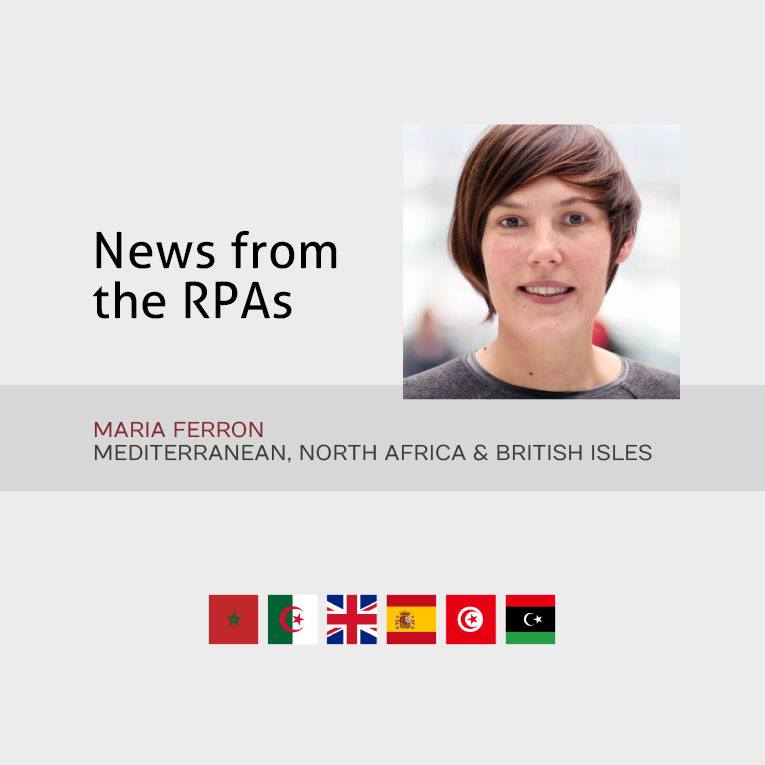During March, the World Allergy Organization (WAO) and the Pan-Arab Society of Allergy, Asthma, and Immunology (PASAAI) organized the WAO Pan Arab Region Virtual Congress with several sessions, including one for HAE. Professor Douagui from Algeria invited me to join the HAE session named “HAE: Identifying & Managing a Potential Killer” that included these speakers:
- “Recurrent Angioedema: When to Suspect HAE” by Professor Iman Nars from Oman
- “Understanding and Navigating the Burden of HAE” by Professor Rand Arnaout from Saudi Arabia
- “Advance of HAE Biologicals” by Professor Marcus Maurer from Germany.
During May, the HAEi 10th hae day :-) was celebrated through all types of exciting activities. Many of the countries in the region were actively participating by adding steps on haeday.org, where we could find interesting information from most of the countries of the Mediterranean, North Africa and British Isles region. Some of the countries had also organized local events to commemorate this day; Morocco and Algeria had local walks with HAE patients, family members and friends, and you can read about the activities done by the United Kingdom and Spain in the section with news from members organizations around the world later on in this magazine.
HAEi is starting to organize the 2021 Middle East, North Africa and Sub Sahara Africa Workshop. We expect to launch this exciting workshop after summer, so please stay tuned through Global Perspectives and our social media channels.
We are happy to announce that the patient group in Tunisia with the doctors’ support are in their final steps to set up an official association. It will be constituted by eight members; three doctors, one lawyer and four patients. At least one member of each HAE family will be represented in the association. The local doctors currently dealing with HAE patients have weekly follow-ups to keep record of the attacks.
I have had a call with one of the association members to introduce and explain all the resources that HAEi has available to help them run the association and provide guidance.
In Libya, the patient lead is planning an awareness campaign to increase knowledge and locate new patients because at the moment they only have around 10 HAE patients in their group. Based on the 1:50.000 ratio, the number should be closer to 132. For this campaign, the patient lead will be using the poster designed by HAEi and a brochure with basic HAE information that HAEi staff members and I will help them develop. The poster and brochure will be distributed in hospitals, clinics, emergency rooms and pharmacies; and the local doctors will be distributing the brochure to their current patients.
In Spain, the HAE organization AEDAF has submitted a proposal to this year’s call for the CSL Behring EU Local Empowerment for Advocacy Development (LEAD) Grant applications, and I am happy to announce that one of the grants has been awarded to AEDAF.
The issue AEDAF addresses is this: Since the approval and commercialization in Spain of modern treatments for HAE, AEDAF has become increasingly aware of major differences in access and availability of these treatments, as well as in approval for patients to keep these treatments at home and learn self-administration, depending on the Autonomous Region where they live, the hospital where they receive care and the physician who treats them. The uneven access and availability of treatments seem to be related to price, but also to differences in knowledge of accepted consensuses and standard of care guidelines or inability or reluctance to observe them.
The objective of the project is to improve the equality of access to healthcare, diagnosis and modern HAE treatments in Spain and thus help HAE patients to take control of their disease and improve their quality of life.
To achieve this objective, AEDAF will:
- Conduct an online survey among AEDAF members and other patients being treated by the lead HAE physicians in Spain to ask about their personal experiences with access to and availability of modern treatments.
- Perform an online survey among physicians managing patients with HAE in different hospitals and Autonomous Regions regarding availability and access to the different drugs used for the treatment of HAE.
- Produce a short video or written document with testimonies of a select number of patients, including patients who do have proper access to modern treatments and others who are still heavily burdened by their disease due to lack of access, which would be used to accompany the survey findings in subsequent actions.
- With a prior press release, submit the survey results to the national Ministry of Health and Regional Ministries of Health in Spain to underline these differences and advocate for equality in healthcare and access for patients all over Spain.
- The survey’s results will also be used to produce an improved, updated list of hospitals in Spain with knowledge of HAE and the availability of modern treatments to replace the outdated list posted on the AEDAF website.
- In the future, AEDAF could use the survey findings to focus on the regions where the situation is most inadequate to conduct workshops, produce online courses for patients and healthcare professionals and in general improve communication, information and advocacy efforts.











